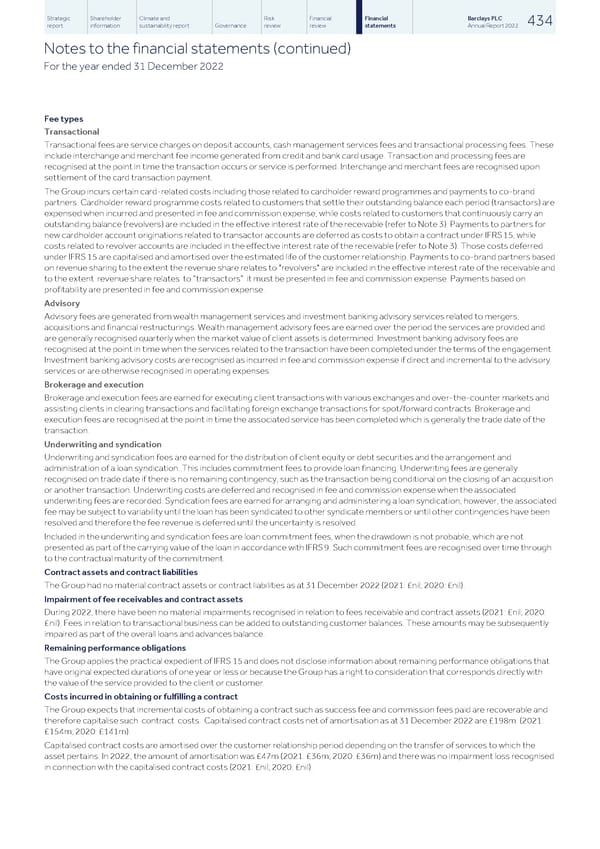Strategic Shareholder Climate and Risk Financial Financial Barclays PLC 434 report information sustainability report Governance review review statements Annual Report 2022 Notes to the financial statements (continued) For the year ended 31 December 2022 Fee types Transactional Transactional fees are service charges on deposit accounts, cash management services fees and transactional processing fees. These include interchange and merchant fee income generated from credit and bank card usage. Transaction and processing fees are recognised at the point in time the transaction occurs or service is performed. Interchange and merchant fees are recognised upon settlement of the card transaction payment. The Group incurs certain card-related costs including those related to cardholder reward programmes and payments to co-brand partners. Cardholder reward programme costs related to customers that settle their outstanding balance each period (transactors) are expensed when incurred and presented in fee and commission expense, while costs related to customers that continuously carry an outstanding balance (revolvers) are included in the effective interest rate of the receivable (refer to Note 3). Payments to partners for new cardholder account originations related to transactor accounts are deferred as costs to obtain a contract under IFRS 15, while costs related to revolver accounts are included in the effective interest rate of the receivable (refer to Note 3). Those costs deferred under IFRS 15 are capitalised and amortised over the estimated life of the customer relationship. Payments to co-brand partners based on revenue sharing to the extent the revenue share relates to "revolvers" are included in the effective interest rate of the receivable and to the extent revenue share relates to “transactors” it must be presented in fee and commission expense. Payments based on profitability are presented in fee and commission expense. Advisory Advisory fees are generated from wealth management services and investment banking advisory services related to mergers, acquisitions and financial restructurings. Wealth management advisory fees are earned over the period the services are provided and are generally recognised quarterly when the market value of client assets is determined. Investment banking advisory fees are recognised at the point in time when the services related to the transaction have been completed under the terms of the engagement. Investment banking advisory costs are recognised as incurred in fee and commission expense if direct and incremental to the advisory services or are otherwise recognised in operating expenses. Brokerage and execution Brokerage and execution fees are earned for executing client transactions with various exchanges and over-the-counter markets and assisting clients in clearing transactions and facilitating foreign exchange transactions for spot/forward contracts. Brokerage and execution fees are recognised at the point in time the associated service has been completed which is generally the trade date of the transaction. Underwriting and syndication Underwriting and syndication fees are earned for the distribution of client equity or debt securities and the arrangement and administration of a loan syndication. This includes commitment fees to provide loan financing. Underwriting fees are generally recognised on trade date if there is no remaining contingency, such as the transaction being conditional on the closing of an acquisition or another transaction. Underwriting costs are deferred and recognised in fee and commission expense when the associated underwriting fees are recorded. Syndication fees are earned for arranging and administering a loan syndication; however, the associated fee may be subject to variability until the loan has been syndicated to other syndicate members or until other contingencies have been resolved and therefore the fee revenue is deferred until the uncertainty is resolved. Included in the underwriting and syndication fees are loan commitment fees, when the drawdown is not probable, which are not presented as part of the carrying value of the loan in accordance with IFRS 9. Such commitment fees are recognised over time through to the contractual maturity of the commitment. Contract assets and contract liabilities The Group had no material contract assets or contract liabilities as at 31 December 2022 (2021: £nil; 2020: £nil). Impairment of fee receivables and contract assets During 2022, there have been no material impairments recognised in relation to fees receivable and contract assets (2021: £nil; 2020: £nil). Fees in relation to transactional business can be added to outstanding customer balances. These amounts may be subsequently impaired as part of the overall loans and advances balance. Remaining performance obligations The Group applies the practical expedient of IFRS 15 and does not disclose information about remaining performance obligations that have original expected durations of one year or less or because the Group has a right to consideration that corresponds directly with the value of the service provided to the client or customer. Costs incurred in obtaining or fulfilling a contract The Group expects that incremental costs of obtaining a contract such as success fee and commission fees paid are recoverable and therefore capitalise such contract costs. Capitalised contract costs net of amortisation as at 31 December 2022 are £198m (2021: £154m; 2020: £141m). Capitalised contract costs are amortised over the customer relationship period depending on the transfer of services to which the asset pertains. In 2022, the amount of amortisation was £47m (2021: £36m; 2020: £36m) and there was no impairment loss recognised in connection with the capitalised contract costs (2021: £nil; 2020: £nil).
 Barclays PLC - Annual Report - 2022 Page 435 Page 437
Barclays PLC - Annual Report - 2022 Page 435 Page 437